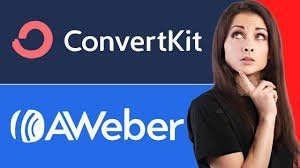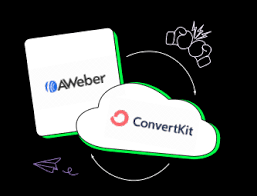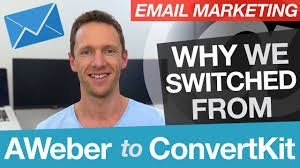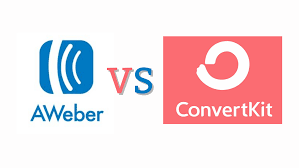AWeber and ConvertKit. In today’s digital landscape, e-mail marketing is an essential tool for companies looking to strengthen their communications and build customer loyalty. Thanks to its effectiveness and relatively low cost, e-mail marketing can reach a wide audience in a targeted and personalised way. However, the success of these campaigns depends largely on the choice of e-mail marketing platform used.
Table des matières
Selecting the right platform is crucial for a number of reasons. First of all, it must offer features tailored to the specific needs of the business, whether it’s a small business or a large corporation. In addition, a good platform must guarantee high e-mail deliverability to ensure that messages reach recipients’ inboxes, and not spam folders. Finally, ease of use and integration with other marketing tools are essential criteria for maximising campaign effectiveness.
Of the many solutions available on the market, AWeber and ConvertKit stand out as two popular, high-performance options. AWeber is renowned for its ease of use and responsive customer support, while ConvertKit is appreciated for its advanced email segmentation and automation features. The choice between these two platforms can have a significant impact on the success of e-mail marketing campaigns, so it’s important to understand their respective advantages and disadvantages.
By addressing the challenges and potential benefits of using solutions such as AWeber and ConvertKit, this analysis aims to guide businesses in their decision, providing them with the essential information to choose the platform best suited to their marketing objectives.

Introducing AWeber
AWeber is a well-established e-mail marketing platform, founded in 1998. For over two decades, AWeber has established itself as a key player in the email marketing industry, offering effective and intuitive solutions for businesses of all sizes. Its rich history is testament to its ability to evolve with market needs, while remaining true to its mission of simplifying e-mail communication for its users.
AWeber’s key features include an extensive library of email templates, allowing users to create professional campaigns without the need for advanced technical skills. Automation is at the heart of the platform, with options for creating automated email sequences, autoresponders and personalised workflows. These tools make it easier to manage marketing campaigns, saving time and increasing efficiency.
In terms of analysis, AWeber offers detailed reports to track campaign performance. Users can obtain valuable information on open rates, click-through rates, conversion rates and much more. These analyses can be used to adjust strategies based on the results obtained and to optimise campaigns for a better return on investment.
AWeber is particularly suited to small and medium-sized businesses, as well as sole traders looking to develop their online presence through e-mail marketing. Typical use cases include newsletters, product promotions, event announcements and customer follow-ups. User reviews are generally positive, highlighting the ease of use of the platform, the quality of customer support and the effectiveness of the automation tools.

Introducing ConvertKit
ConvertKit is an email marketing platform that is particularly popular with content creators, bloggers and small businesses. Founded in 2013 by Nathan Barry, ConvertKit has quickly established itself as the solution of choice for those wishing to manage their email marketing campaigns effectively. ConvertKit’s main aim is to simplify the process of communicating with subscribers while offering advanced features to maximise the impact of campaigns.
One of ConvertKit’s key features is its advanced automation sequences. With these sequences, users can create automated workflows that send emails based on specific subscriber actions, such as opening an email or clicking on a link. This feature helps to personalise the subscriber experience and increase engagement.
ConvertKit also offers intuitive subscriber management. Users can segment their subscriber list according to various criteria, such as interests or past behaviour, enabling messages to be targeted more precisely. In addition, ConvertKit makes it easy to import and export contact lists, which is essential for those migrating from another platform.
When it comes to integration, ConvertKit stands out for its compatibility with a host of third-party tools, including WordPress, Shopify and Zapier. These integrations allow users to easily connect ConvertKit with other applications they already use, making their workflow smoother and more efficient.
The businesses that would benefit most from ConvertKit are those that focus on content creation and online sales. For example, bloggers can use ConvertKit to send personalised newsletters to their readers, while online shop owners can automate their product promotion campaigns. User testimonials often highlight the ease of use and powerful automation tools as major strengths of the platform.
In short, ConvertKit is a robust and flexible e-mail marketing platform, ideal for content creators and small businesses looking to optimise their communication with subscribers.

Pricing and value for money, AWeber and ConvertKit
Pricing plans
AWeber offers pricing based on the number of subscribers, with plans starting at $19 per month for 500 subscribers. AWeber also offers a free version with limited functionality for beginners.
ConvertKit starts at $29 per month for 1,000 subscribers and offers a free version for users with up to 300 subscribers. ConvertKit offers robust functionality even in its basic plans, making it a cost-effective option for content creators.
Value for money
In terms of value for money, AWeber is often preferred by businesses needing advanced functionality and numerous template options. ConvertKit is better suited to content creators looking for a simple, effective platform with powerful automation options.
Comparison of key features, AWeber and ConvertKit
When it comes to choosing between AWeber and ConvertKit for your e-mail marketing needs, it’s crucial to compare the key features of each platform. Automation tools, for example, are essential for optimising your campaigns. AWeber offers a variety of predefined automation templates, making it easy to create complex email sequences. ConvertKit, on the other hand, relies on a simplified user interface with visual automations, which can be an advantage for those who prefer a more intuitive approach.
In terms of personalisation, both platforms offer advanced email customisation. AWeber offers extensive options for personalising every aspect of your emails, from fonts to images. ConvertKit, although more minimalist, also allows for advanced personalisation, notably through the use of tags and segments to target specific audiences in a more granular way.
Analysis and reporting capabilities are key to assessing the performance of your campaigns. AWeber provides detailed reports on metrics such as open rate, click rate and conversion rate. ConvertKit also offers in-depth analyses, but stands out for its ability to track subscriber actions in real time, enabling immediate adjustments to be made if necessary.
When it comes to integrations, AWeber excels with a wide range of compatibilities with other software, from e-commerce platforms to CRM tools. ConvertKit, while less extensive, offers crucial integrations with popular tools like Shopify, WordPress, and Zapier, making it easy to integrate into your existing ecosystems.
In short, both platforms offer robust and versatile functionality. The choice between AWeber and ConvertKit will largely depend on your specific needs in terms of automation, customisation, analysis and integration. An in-depth analysis of these aspects will help you determine which platform is best suited to your e-mail marketing objectives.

Advantages and disadvantages of each platform
When it comes to choosing between AWeber and ConvertKit for your e-mail marketing needs, it’s crucial to weigh up the pros and cons of each platform.
AWeber stands out for its ease of use, making it an attractive option for beginners and small businesses. Its intuitive user interface makes it easy to get to grips with, without requiring advanced technical skills. In addition, AWeber offers excellent customer support, available 24/7, which is a major plus for users requiring immediate assistance. However, despite these strengths, AWeber does have some limitations, particularly in terms of advanced functionality. Automation options are less sophisticated than those of ConvertKit, and email customisation options may seem limited for more experienced users.
ConvertKit, on the other hand, is renowned for its powerful automation and personalisation capabilities. This platform is particularly popular with content creators and bloggers looking to segment their audience precisely and send highly personalised emails. ConvertKit’s automation workflows enable complex customer journeys to be created, which can greatly improve engagement and conversion. Nevertheless, ConvertKit can pose challenges, not least in terms of cost, which is generally higher than AWeber’s, especially for large subscriber lists. In addition, the learning curve can be steeper, requiring a certain investment of time to fully master all the available features.
In short, the choice between AWeber and ConvertKit will depend on your specific needs and skill level. AWeber is ideal for those looking for a simple solution and responsive customer support, while ConvertKit is better suited to users who want to exploit advanced automation and customisation capabilities, despite a potentially higher cost and steeper learning curve.

Conclusion and recommendations, AWeber and ConvertKit
When comparing AWeber and ConvertKit, several key points emerge, each with its own strengths and weaknesses depending on the specific needs of businesses. AWeber boasts an intuitive user interface and numerous automation features, making it an excellent option for small businesses and entrepreneurs looking for a comprehensive, easy-to-use solution. Its ability to offer a variety of ready-to-use email templates and advanced segmentation options is a major plus.
ConvertKit, on the other hand, is particularly popular with content creators, bloggers and small businesses who need an e-mail marketing platform focused on creating personalised content and engaging subscribers. Its simplified interface and subscriber management features are designed to encourage more personal and targeted communication, which can be crucial for businesses looking to build strong relationships with their audience.
For medium to large businesses, or those with more complex segmentation and automation needs, AWeber is often the recommended choice. On the other hand, for content creators and small businesses who want a more direct and personalised approach, ConvertKit may offer a more suitable solution.
Ultimately, the choice between AWeber and ConvertKit will depend on your specific e-mail marketing objectives. To optimise your campaigns, it’s essential to clearly define your needs, test the different features offered by each platform, and choose the one that best aligns with your marketing strategies. A rigorous assessment of costs, customisation options and customer support can also guide your decision. By adopting the most suitable platform, you’ll be able to maximise the effectiveness of your e-mail campaigns and successfully achieve your business objectives.

User testimonials
Testimonial 1: Growing SME
Sophie, founder of an online clothing shop
‘With AWeber, we’ve managed to increase our email open rate by 20% thanks to their automation features. The variety of templates has enabled us to create professional newsletters that attract the attention of our customers. Their 24/7 customer support has been a major asset for us, especially when we have encountered technical difficulties. I highly recommend AWeber for small businesses looking to professionalise their email communications.’
Testimonial 2: Content creator
Julien, blogger and podcaster
‘ConvertKit has revolutionised the way I manage my subscribers and e-mail marketing campaigns. The simplicity of the interface and the automation tools have saved me precious time. Since I started using ConvertKit, my conversion rate has increased by 15%. Their platform is ideal for content creators like me who are looking for a no-fuss solution.
Testimonial 3: Marketing manager
Claire, Marketing Manager at a technology start-up
‘We tested AWeber and ConvertKit, and finally opted for AWeber. Their analysis tools helped us to understand our subscribers’ behaviour and adapt our strategies accordingly. Access to a rich and varied library of templates was an undeniable plus for our campaigns. Thanks to AWeber, we have seen a 25% increase in subscriber engagement.
Testimonial 4: Marketing consultant
Marc, digital marketing consultant
‘For my clients, ConvertKit is often the best option. The platform is designed to be intuitive and easy to get to grips with, which is crucial for those who aren’t tech-savvy. The ability to create automatic email sequences visually is a real game-changer. What’s more, ConvertKit offers excellent value for money for small businesses and content creators.’
Testimonial 5: Online publisher
Léa, editor-in-chief of an online magazine
‘AWeber has been an essential tool for our e-mail marketing strategy. The advanced automation features have enabled us to segment our audience effectively and send personalised messages. The quality of customer support is exceptional, always available to resolve our problems quickly. AWeber has helped us retain our readers and grow our subscriber base.’
Recurring questions
- Which platform offers the best customer support?
AWeber offers 24/7 customer support via chat, phone and email, which is more comprehensive than ConvertKit.
- Is ConvertKit more suitable for beginners?
Yes, ConvertKit is designed to be easy to use and intuitive, ideal for content creators and beginners in e-mail marketing.
- Does AWeber offer a free version?
Yes, AWeber offers a free version with limited functionality for novice users.
- How much does ConvertKit cost compared to AWeber?
ConvertKit starts at $29 per month for 1000 subscribers, while AWeber starts at $19 per month for 500 subscribers.
- Which platform offers more email templates?
AWeber offers over 700 email templates, which is far more than ConvertKit offers.
Conclusion
Choosing between AWeber and ConvertKit depends on your specific needs and the nature of your business. AWeber is recommended for businesses looking for advanced features and full customer support, while ConvertKit is ideal for content creators looking for a simple and effective solution. By understanding the benefits and limitations of each platform, you can make an informed choice to optimise your e-mail marketing strategy.





Ping : E-mail Marketing with Systeme.io Marketplace: An Essential Strategy for Companies in 2024 - Logiciels marketing